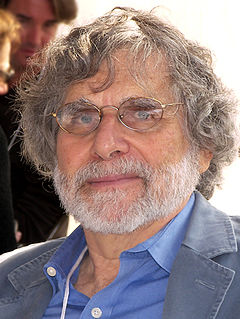A Quote by Edward Abbey
John Updike: our greatest suburban chic-boutique man of letters. A smug and fatal complacency has stunted his growth beyond hope of surgical repair. Not enough passion in his collected works to generate steam in a beer can. Nevertheless, he is considered by some critics to be America's finest *living* author: Hold a chilled mirror to his lips and you will see, presently, a fine and dewy moisture condensing -- like a faery breath! -- upon the glass.
Quote Topics
Related Quotes
An old essay by John Updike begins, 'We live in an era of gratuitous inventions and negative improvements.' That language is general and abstract, near the top of the ladder. It provokes our thinking, but what concrete evidence leads Updike to his conclusion ? The answer is in his second sentence : 'Consider the beer can.' To be even more specific, Updike was complaining that the invention of the pop-top ruined the aesthetic experience of drinking beer. 'Pop-top' and 'beer' are at the bottom of the ladder, 'aesthetic experience' at the top.
I wish to suggest that a man may be very industrious, and yet not spend his time well. There is no more fatal blunderer than he who consumes the greater part of his life getting his living. All great enterprises are self-supporting. The poet, for instance, must sustain his body by his poetry, as a steam planing-mill feeds its boilers with the shavings it makes. You must get your living by loving.
So now, how did God produce this world?... The fable is that he breathed upon us. In his breath, his wind, came moisture and things began to grow... a message of hope. Nothing physical. How do you intend for your breath to become a work of art? The only way I can see it is that you prevent your breath from becoming a structure. As soon as your breath takes on the form of a room, you are a carpenter; you're not God.
In some ways, Herbert Hoover can be considered a millennial in spirit: young at the turn of the century, aware of America's past but deeply committed to building its future. His greatest passion and highest calling was service to others, and he measured his life's successes not in dollars and votes but in results achieved.
The great liability of the engineer compared to men of other professions is that his works are out in the open where all can see them. His acts, step by step, are in hard substance. He cannot bury his mistakes in the grave like the doctors. He cannot argue them into thin air or blame the judge like the lawyers. He cannot, like the architects, cover his failures with trees and vines. He cannot, like the politicians, screen his shortcomings by blaming his opponents and hope the people will forget. The engineer simply cannot deny he did it. If his works do not work, he is damned.
I am thinking of George Michael's family, friends and fans. He was so loved and I hope he knew it because the sadness today is beyond words. Devastating. What a beautiful voice he had and his music will live on as a testament to his talent. I can't believe he is gone. I hope the Buddha will hold him in his arms. NMRK.
The artist of the future will live the ordinary life of a human being, earning his living by some kind of labour. He will strive to give the fruit of that supreme spiritual force which passes through him to the greatest number of people, because this conveying of the feelings that have been born in him to the greatest number of people is his joy and his reward. The artist of the future will not even understand how it is possible for an artist, whose joy consists in the widest dissemination of his works, to give these works only in exchange for a certain payment.
Sad to think that we won't have any new stories from John Updike, one of the last century's masters. But so many here in the two volumes of his collected stories, 186 by my count, stories to read, reread, savor over the course of a cold season. Updike's genius in the short form spills out of these many, many pages.


































